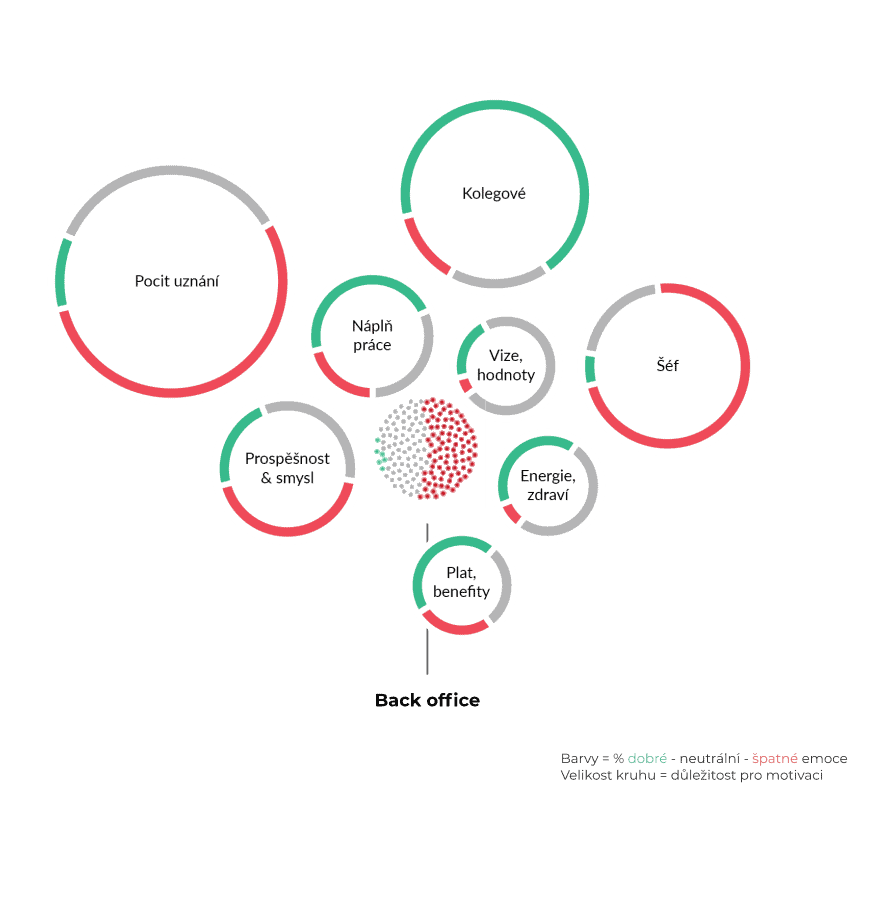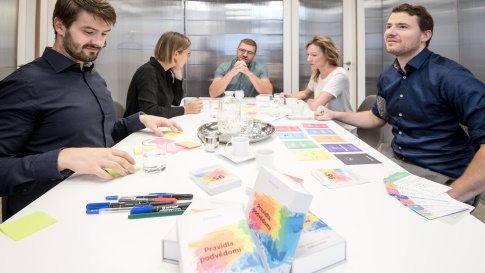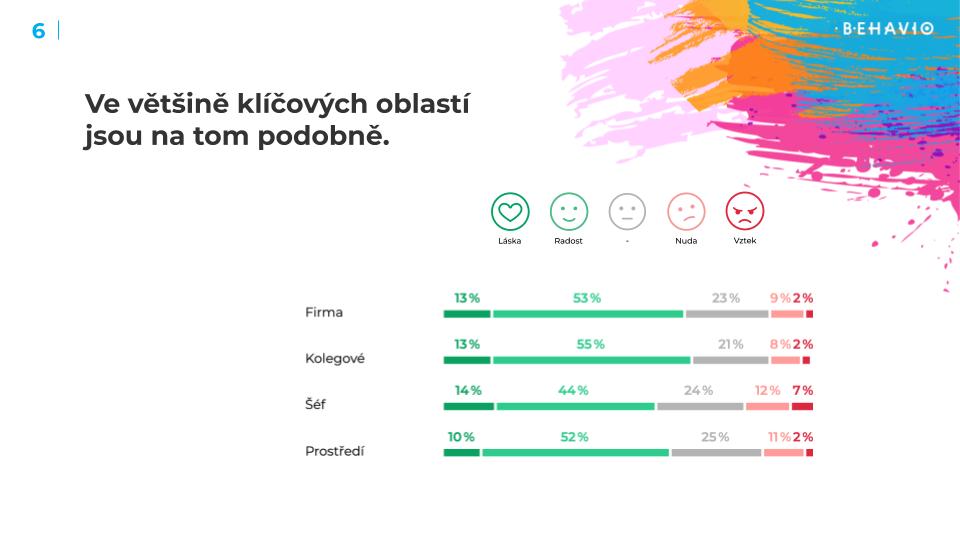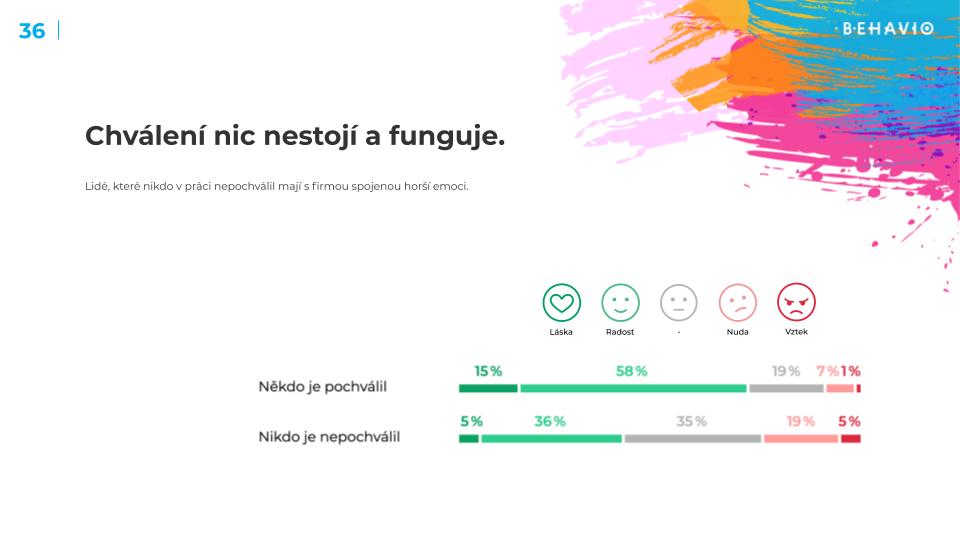How to turn your company into an employee lovebrand
-
 Vojtech Prokes
Vojtech Prokes
- 1. March 2022
We spend a third of our lives at work. It plays a fundamental role in how we feel and on our health. More satisfied employees even perform better and are more loyal. Simply put, these people don’t have a reason to find another workplace. Every company has a slightly different micro-culture, they are built upon different values. Thanks to our extensive research efforts, we came to discover that some rules are actually universal and they improve the atmosphere in both start-ups and multinational corporations. And, just as our research shows, productivity rises with satisfaction, as does profit. Before we go to far, however, let’s take a look at the inventory of ratios on our employment market.
Czech companies: Not great, not terrible
Employment in the Czech Republic isn’t just the place we go to get money, it also has one other important function – community. In secular society, work is our meeting place, the place where we create bonds. Even more important than that, work is a place where people feel good. Unfortunately, this often isn’t the case. One third of Czechs are absolutely unhappy at work. According to our data, the cliches about a country of dumpling eaters who grumble and don’t set into action just for anyone ring true. 89% of people don’t want to leave their work within the following 3 years, even though they have many serious reservations about what they do.
One of our methods is to ask respondents about their feelings. These questions often better reflect reality than rationalized statements. From our emotions test, we found that most of the main categories (company, colleagues, boss, and environment) score quite similarly on our scale. You can’t pinpoint only a single weak point, nor can you find some exemplary problem-free area. However, if you were to take one figure from the graph below, it should be this: only 13% of people are excited about their work. Let’s take a look at this in further detail. Before we do that, however, we will shed light on other scandals which cause Czech companies to unnecessarily lose money.
Bosses
The typical Czech leader is a professional in their field (78%), however, they aren’t very good with people, or they just don’t have time for them. They aren’t very successful in making their team excited (72%) and are uninspiring (62%).
Praise
Only half of employees were praised for something in the last few weeks. That praise most often comes from their supervisors or colleagues, even though praise given by company management is the most effective way to motivate employees. And yet, only 15% of employees received any praise from management in the last few weeks.
Payment
Just over half of Czech employees (53%) feel that they receive fair payment. 35% of unsatisfied employees are expecting their payment to improve soon.
Feedback
Only about half of people receive feedback, and according to them, the feedback they receive is often nonspecific (31%), unclear (31%), or downright demotivating (26%).
We were surprised to find out that most companies don’t receive feedback from their employees. 80% of people told us that their employer never asks them about this kind of thing. Knowing that you have a problem is, of course, the first step in making improvements. So…:
What should I do about it?
Love your brand lovers
By that we mean the average 13% of employees who are in love with their work, they have inner motivation to complete their tasks well, and they care about the results. These kinds of people are better than gold for any company. According to the 30 years of research from the Gallup company, which was performed on 30 million employees worldwide, internally passionate employees – lovebrand employees – increase productivity and profitability by more than 20%, and they reduce turnover by up to 65%, improving the customer experience and the quality of the final product.
So, how do you go about creating these lovebrand employees? This type of employee most often flourishes under one specific type of leader. It’s been proven that the most effective team isn’t led by someone who tries to keep everyone in line no matter what. Actually, the opposite is true. A boss who dedicates time to their staff and is capable of giving praise has better results. Most lovebrand employees have a good relationship with their boss. They don’t have to absolutely love their boss, but a positive atmosphere and human-like conduct is a must.
Companies that have a clearly formed vision, which helps the employees to feel like they serve the company in more than just generating profit, are better at creating lovebrand employees. It is quite helpful when employees feel that their work is useful and beneficial to the company. In short, a company can find potential lovebrand employees if it actually treats them like people.
The human approach and a friendly environment create the largest gap for Czech companies. In this, they are literally leaving free money sitting on the ground. According to our calculations, based on the work of economists from Oxford, MIT, and London School of Economics, a quarterly increase in employee satisfaction would bring Czech companies up by as much as CZK 200 billion, thanks to a 5% increase in productivity.
Lukáš Tóth, Behavioural Economist
Praise, praise, praise... Then praise some more
Praise has a fundamental impact on motivation. And it’s completely free. However, be careful – even praise has to be given correctly. Companies often send enormous amounts of emails with formal “thank-you” phrases written at the bottom that never actually effect anyone, nor the quarterly bonus for that matter. This kind of impersonal, companywide pat on the back does nothing for increasing performance in individual employees. These people need to know that someone sees their efforts, meaning it is best by far to appreciate what they have done in the most direct and specific way possible. And since we’re on the subject, don’t wait to give praise until after the results come in.
Have fun together
Apart from praise and communication, organizing teambuilding exercises, parties, and other various activities for employees helps to value the work of each individual. Time spent together is an effective way of improving emotions in the team, and therefore in the entire company, just as social celebrations help to drive success. These events, however, are quite rarely organized in the Czech Republic.
He who asks nothing, learns nothing
We discussed what has gone “rotten in Czech companies”, as well as basic advice on how this issue could be dealt with. However, every industry and every company have their own unique problems, and yet their management team often doesn’t even know how to find these problems, let alone how to deal with them. Logically, the first offered solution is to talk to anyone involved, yet only 21% of employees are asked about their observations regarding the operation of the company. The good news is 91% of these employees were glad such an effort was made, and they are interested in having their opinions heard.
The key is to “ask” and to “ask” again. There are primarily two kinds of corporate research. The first kind is research performed once a year, where a large packet is sent out and the employees spend 40 minutes filling it in. They end up sweating a lot over questions such as: “rate on a scale from 1 to 13 how much you agree with the following statement”. Naturally, half the people switch over to autopilot mode and simply give a random answer, therefore rendering half of the research useless. The only problem is no one knows which half you need to take seriously.


The second kind is called a pulse survey. As a rule, these are shorter surveys that are sent maybe once every two weeks with concise questions of the “How do you feel?” type. This is better, but, after some time, this kind of research stops providing new information and any hidden issues remain unfound. With these two paths in mind, we would now like to introduce you to the third option.
Minutes For Better Work
Also known as minute-long questionnaires, which lead step by step to a better performing company, full of motivated employees.
They truly only take a minute
They’re entertaining, diverse, associative, and full of pictures. No need to think about anything for long. Employers only have to react to answers that show a distinct problem in the company. We’ve tested these surveys on people of all ages, social groups, and occupation types. The result: they would like to fill them out at work too.
They even capture people's deeper motivations
Not many people are willing to say their performance has gone down because their boss hasn’t given them praise in the past few weeks. Often times, they aren’t even aware of this. We collected reactions from thousands of people on every aspect of their work, and, with the help of mathematical algorithms, we found some hidden connections. This is why we know what to ask about in our surveys, and how much weight we should apply in each area. And yes, praise is fundamental.

The results in context
You can compare the hundreds of questions from each Minutes for Better Work survey with your competition in the Czech Republic. We have benchmarks for both large and small companies, offices and factories, the state and private sectors. You can also compare individual teams, or even key employees, with those who are easily replaceable. By doing so, you can better focus on what’s truly important.
We discovered what people were satisfied with, where we have reserves when working with employees, and what we should improve in our internal communications and management of the collective. Our employees truly appreciated the possibility to give us feedback.
Ing. Jan Landa
státní tajemník

Give it a try
Introductory research is free. We will distribute a survey that maps out the most important elements to 50 of your employees for free. We will find out what’s keeping them around, and what might be discouraging them in the workplace.

Good food and relationships at the workplace
The Prague network of restaurants and shops, in which the Kantýna and Eska restaurants are a part of, as well as the ‘Naše maso’ butcher, is able to keep its people enthused. 4 out of 5 employees from headquarters have positive emotions connected to their work. They see purpose in what they do as they teach people to consume quality food. In terms of their services and products, few employees have any reservations. However, a few feel that the company pushes a bit too hard on innovation. An area for improvement is in split competency; a third of people do not know exactly what they are responsible for.

A deeper calling motivates the majority
The Ministry of the Environment of the Czech Republic is a pilot partner of Minutes for Better Work. Our research of over 600 employees discovered that 61% of them feel positively toward their work. The majority of people see a deeper calling to working at the Ministry. Younger people and employees who have worked at the Ministry between 1-2 years, however, significantly differ in their perception of the company vision. This group deserves more attention, as they tend to consider leaving their position the most.
Companies need feedback from within
Has the quick growth of your company changed its culture? That’s something we were able to measure for this small and energetic IT company. We carried out personal interviews at 4 store locations and distributed our questionnaires, “Minutes for Better Work”. We increased participation up to 90%, and it turned out the company is doing great, aside from a few small details, which we then helped to resolve. To keep on track, we repeat this research process every year.
Interviews regarding Minutes for Better Work
Our co-owner and behavior economist, Lukáš Tóth, spoke in detail about the entire research process on DVTV. He also spoke about the topic on a personal level for the website Digichef. It’s here you can find stories about how we decided to lead by example, i.e. we (everyone here at Behavio) also underwent our same research process regarding employee satisfaction. The results were quite surprising, especially with regard to how often we go out for a beer with our colleagues.




